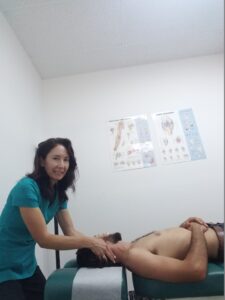
This post is about Dizziness and Vertigo: A West Palm Beach Chiropractic Center Can Help. You may feel the room is spinning? You may feel motion imbalance or a lack of coordination while walking? Moreover, you may have lightheadedness or presyncope (sensation of almost fainting)? At a West palm beach chiropractic center, the most frequently seen cases are those associated with motor vehicle cervical(neck) spine/head injuries and in the elderly. Dizziness may be one of the top three symptoms reported after acceleration/ deceleration (whiplash) injury to the neck.
Anatomy and Physiology
Your balance and spatial orientation are maintained by an integrated neuronal (relating to nerve cells) feedback loop. Feedback loops are circuits that return output as input to a given system.
The components of the related systems for balance and spatial orientation:
(1) The vestibular system includes the parts of the inner ear and brain that process the sensory information involved with controlling balance and eye movements.
(2) The visual system constructs a mental representation of the world around us. It includes both the eyes and the brain.
(3) The proprioceptive system is guided by receptors in the body (skin, muscles, joints) that connect with the brain through the nervous system. Proprioception is your body’s ability to sense movement, action, and location.
So a slow adaptation by your nervous system can be made to compensate when input from any of the above components (systems) is dysfunctional.

Dizziness and Vertigo in Younger Adults and Older Adults (Elders/Seniors)
At a Dizziness and Balance Clinic for patients over age 65, the distribution of cause for dizziness was the following:
-32 %, due to benign paroxysmal positioning vertigo
-22 % was due to either fear of falling or disuse equilibrium (state of physical balance)
-13 % was due to vestibular (chamber of inner ear) loss
All other causes accounted each for 5% or less of cases. Additionally, the elderly population, in particular, is more prone to the vertiginous (causing vertigo) effects of medications and the lack of compensation by another system. In contrast, a younger person may have this ability to compensate through one of the other systems for balance.
In other words, if one is dysfunctional, the nervous system may accommodate through input and adaptation from the other systems. However, in the elderly, there may be a general deterioration of all neural (relating to nerves) systems. And perhaps complicated by other diseases such as diabetes or atherosclerosis, in elderly, the adaption is made less effective and dizziness more disabling.
Cervical (neck) Spine and Dizziness/Vertigo
It is unclear how many cases are due to neck proprioceptors versus the vestibular apparatus or vascular supply to the head and neck. Nevertheless, proprioceptive information from the upper cervical musculature and joints do play a major role in your perception of balance. The high density of receptors in the spine may have effects on these reflexes for balance. Also, if there is damage to the vestibular apparatus, these spinal reflexes may help compensate.
Firstly, cervicogenic vertigo is a result of cervical joint dysfunction, muscle strain, or injury from trauma such as a whiplash-like accident. Over-stimulation from joint dysfunction, muscle spasm or damage to the upper cervical proprioceptors can result in an imbalance of proprioceptive information. Secondly, the basic science support for this comes from numerous studies that have shown ataxia (lack of voluntary coordination of muscle movements), nystagmus (fast, uncontrollable movements of the eyes), and/or dysequilibrium (sensation of being off-balance) with strained muscles or upper cervical nerve roots. Thirdly, vibration of muscle tendons or the head can create a “postural illusion” leading to nystagmus and motion sickness.
Lastly, there is an overlap between cervicogenic (spinal) vertigo and other peripheral (not central nervous system) vestibular vertigos such as Benign paroxysmal positional vertigo (BBPV) and Meniere’s disease. And for Meniere’s disease, Chiropractors help treat the symptoms of vertigo naturally.

West Palm Beach Chiropractic Treatment for Dizziness/Vertigo
- Chiropractic Manipulative therapy
- Habituation exercises/therapy (exercises which aim to strengthen the vestibular system)
- Epley Canalith repositioning maneuver- (non-invasive treatment for the most common cause of vertigo, benign paroxysmal positional vertigo (BPPV). Epley Maneuver is a type of maneuver that helps to clear the debris that is settling in the ear.
- Diet/lifestyle changes
Our other treatments, such as soft tissue techniques, therapeutic exercise, electric muscle stimulation, ice/ heat therapies and homeopathic consultations, may also provide relief for your pain, dizziness and/or vertigo.
In West Palm Beach, Meiri Chiropractic has given hope to patients with dizziness/vertigo and many other ailments. This has given them a better quality of life with a safer, natural and effective treatment for their symptoms.
If you or a loved one is suffering from dizziness or vertigo, call our chiropractic care center at 561-253-8984 to make an appointment or ask about Dizziness and Vertigo: A West Palm Beach Chiropractic Center Can Help.